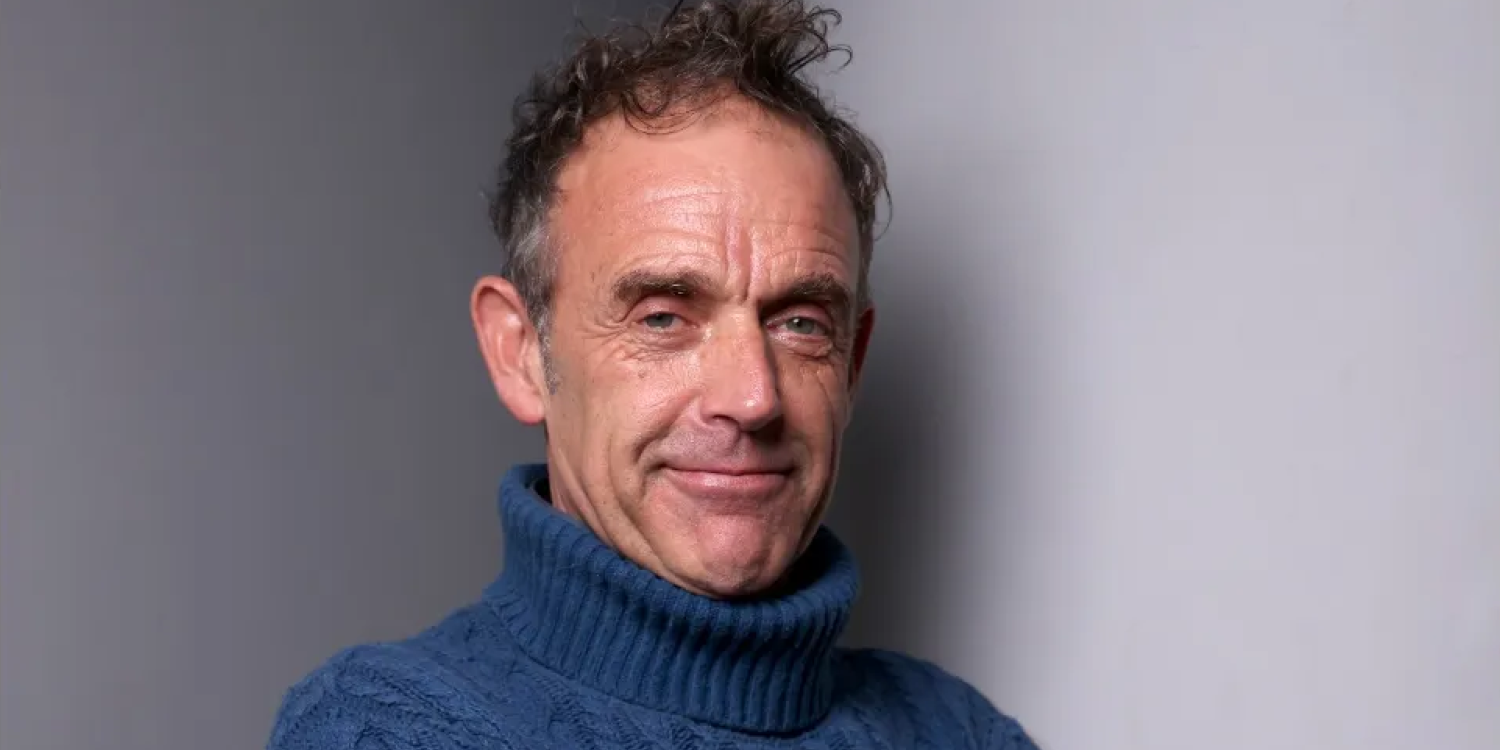A Film Screening of Soundtrack to a Coup d’Etat and Presentation on G.A.S. Foundation
On August 29th, 2025, G.A.S. Lagos hosted Open House, featuring a film screening of Soundtrack to a Coup d’Etat alongside a presentation that offered a closer look into the Foundation’s mission and opportunities. The evening brought together both new and returning audiences, fostered conversation, and offered deeper insight into G.A.S. Foundation’s role as a hub for artistic research, collaboration, and exchange.
 The Great Room, a multifunctional event and studio space on the ground floor of G.A.S. Lagos.
The Great Room, a multifunctional event and studio space on the ground floor of G.A.S. Lagos.
The session opened with an introductory presentation by Moni Aisida, Executive Director of G.A.S. Foundation, who reflected on the organisation’s journey from inception to its present-day activities. She spoke about the Foundation’s origins, its mission to support the development of new work and ideas, foster cultural understanding, and break down barriers of privilege, while also introducing its sister organisation, Yinka Shonibare Foundation (Y.S.F.).
Through images, Moni highlighted the Foundation’s two spaces in Lagos and Ikiṣẹ, the diversity of past residents, and the three core areas of inquiry, Ecology, Farming and Food; Materiality; and Archives and Publishing. She also touched on non-resident programmes such as the Ìmòra Arts Intensive, and My Story of Food - On The Farm!, delivered in partnership with the Five Cowries Arts Education Initiative (FCI).
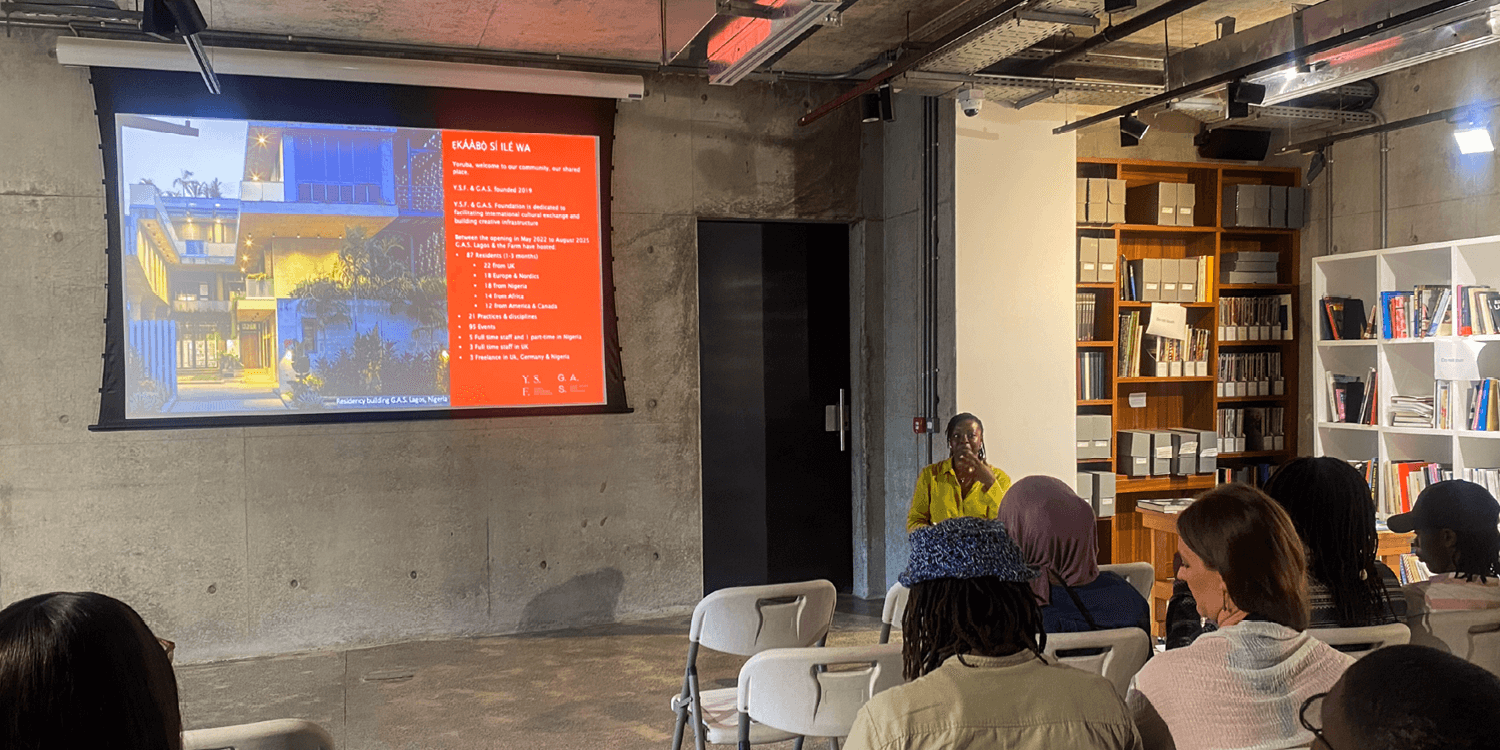 Executive Director Moni Aisida presenting at Open House.
Executive Director Moni Aisida presenting at Open House.
The evening continued with contributions from former participants. Nengi Nelson, a 2025 G.A.S. alumna, spoke about her practice, rooted in reflection and curiosity, and how the residency provided space to further her project All the Places I Have Lived. This body of work explores the fluidity of home as experienced by individuals navigating reverse migration. She shared how the G.A.S. Library and Picton Archive enriched her process, citing resources such as G.A.S. Alumna Joy Labinjo's Monograph, When We See Us: A Century of Black Figuration in Painting, The Artist’s Studio, and The Peopling of London as invaluable references.
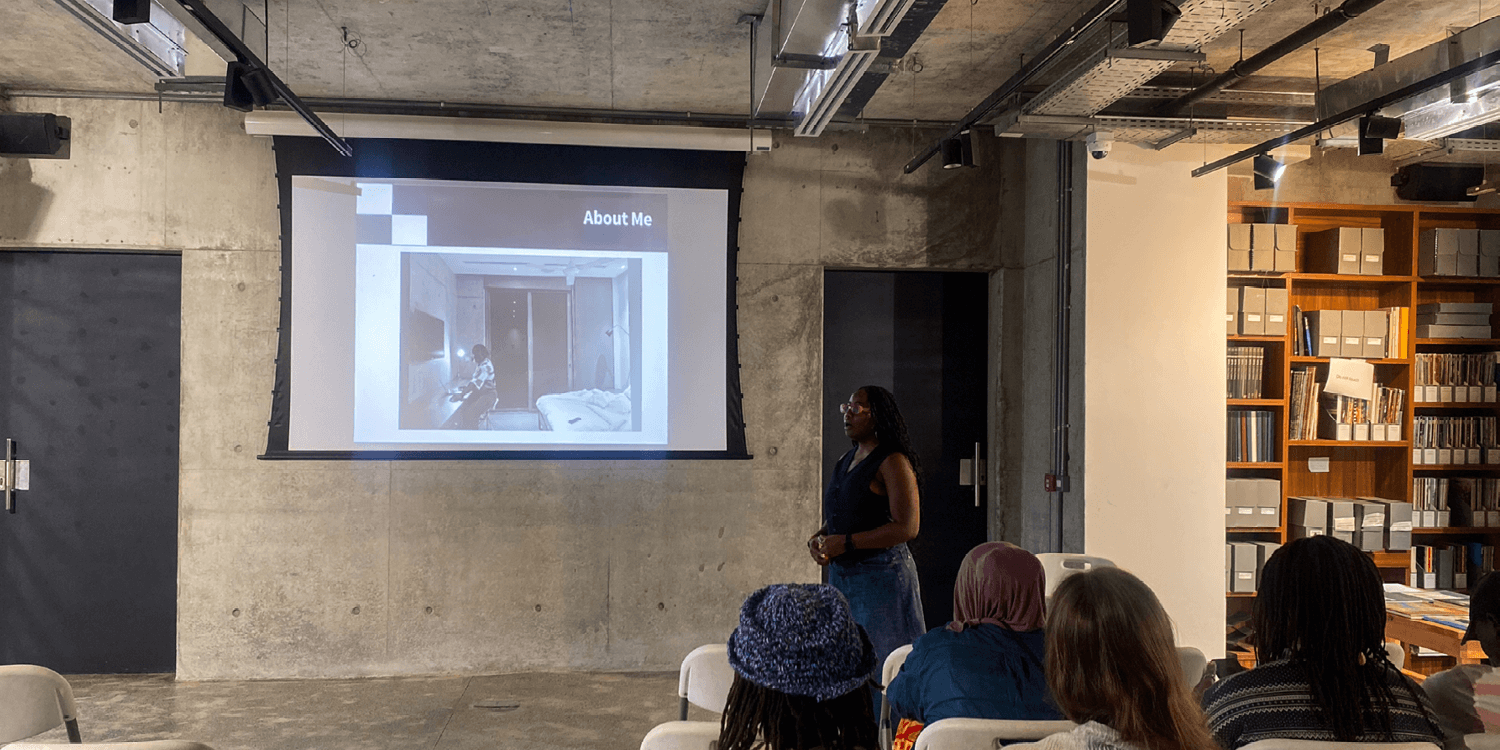 G.A.S. Alumna Nengi Nelson presenting at Open House.
G.A.S. Alumna Nengi Nelson presenting at Open House.
Following her, Okwudini Noah, a participant in the Ìmòra Arts Intensive, spoke about his experimental practice across sound, image, writing, and collective work. He reflected on how the intensive helped him expand his methodologies, slow down, and consider new approaches to collaboration and collective practice, opening up fresh opportunities for his work.
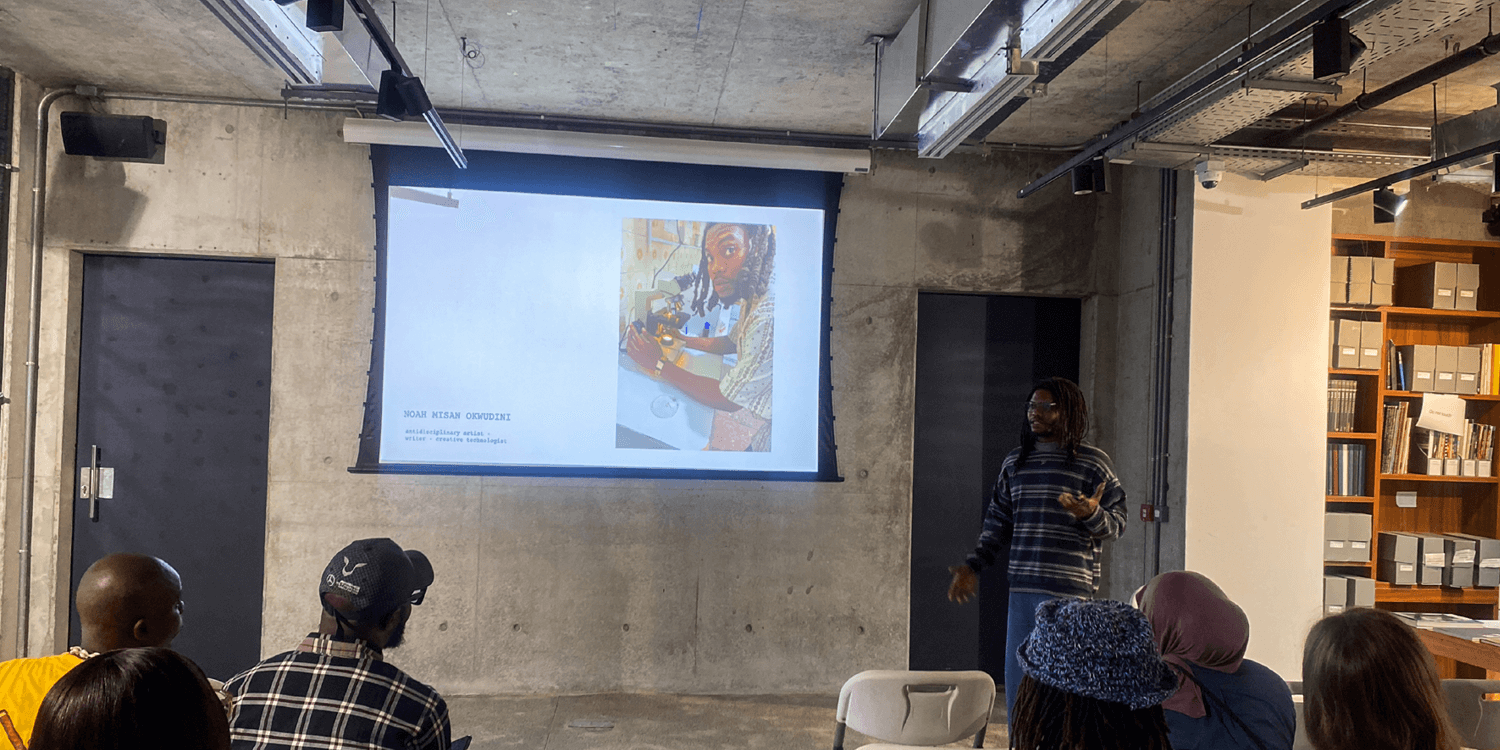 Okwudini Noah presenting at Open House.
Okwudini Noah presenting at Open House.
Following the presentations, guests had the chance to engage directly with the speakers, asking questions and sharing reflections before breaking into smaller groups for a building tour. Led by Adekunle Adeboye, Residency and Operations Manager at G.A.S., and Moni Aisida, the tour offered a look at the G.A.S. Library and Picton Archive, as well as the living and working spaces used by residents.
The evening concluded with a screening of Soundtrack to a Coup d’État (2024), a documentary by Belgian multimedia artist, filmmaker, and curator Johan Grimonprez. Revisiting the Cold War episode surrounding the assassination of Congolese leader Patrice Lumumba, the film traces how musicians Abbey Lincoln and Max Roach disrupted the UN Security Council in protest. The documentary also weaves in excerpts from My Country, Africa by Andrée Blouin (narrated by Marie Daulne aka Zap Mama), Congo Inc. by In Koli Jean Bofane, To Katanga and Back by Conor Cruise O’Brien (narrated by Patrick Cruise O’Brien), as well as the audio memoirs of Nikita Khrushchev.
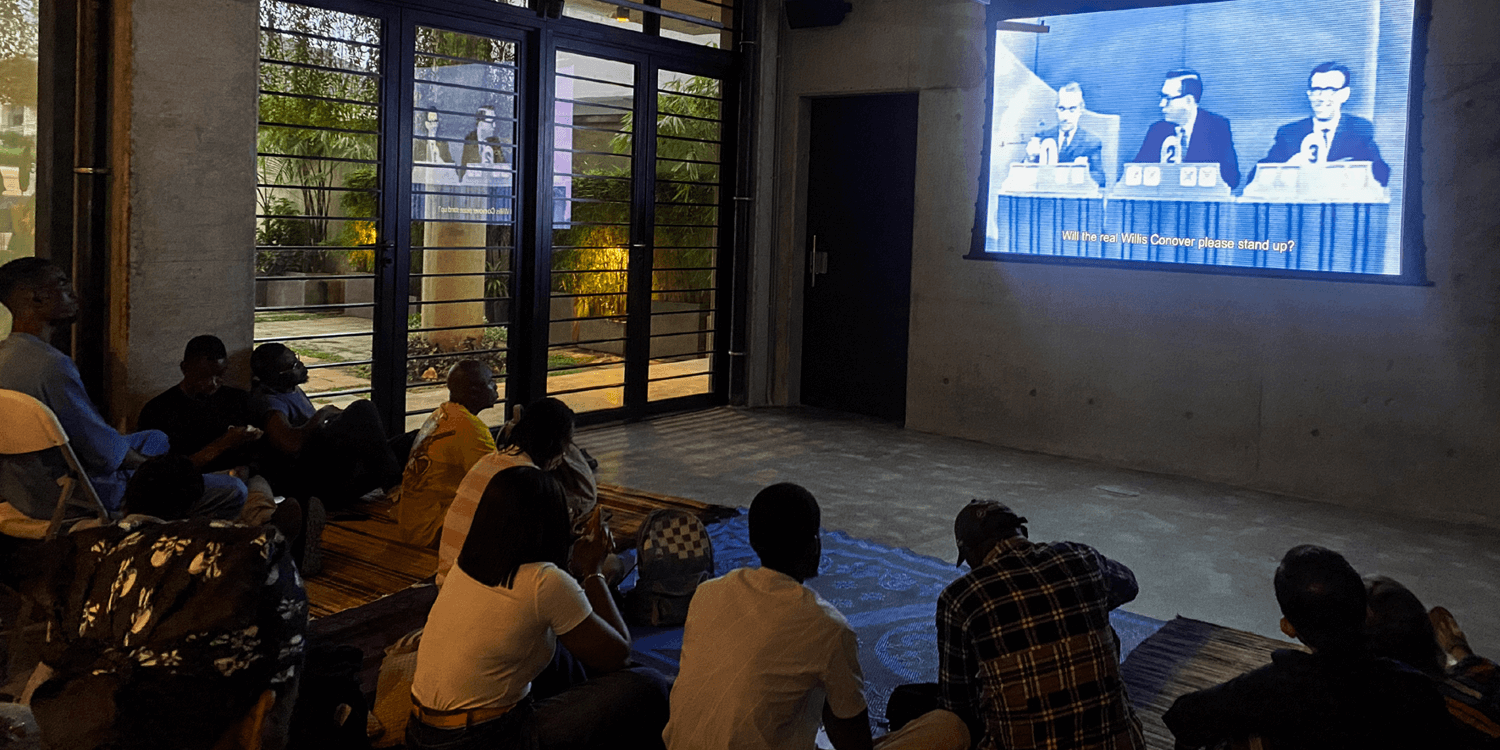 Guests watching Johan Grimonprez's Soundtrack to a Coup d’État at Open House.
Guests watching Johan Grimonprez's Soundtrack to a Coup d’État at Open House.
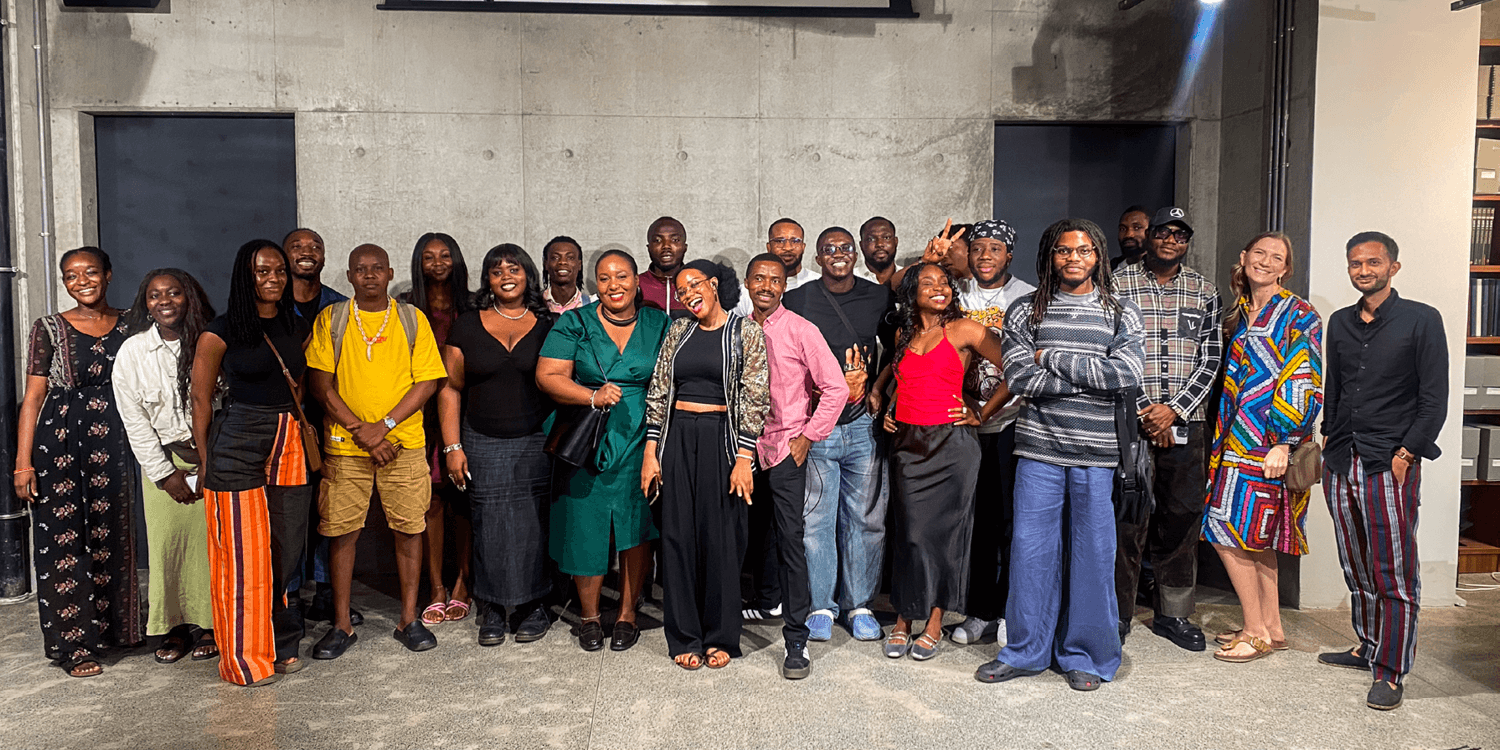
Event Details
Date: 29th August, 2025
Time: 4:00 pm - 8:00 pm
Location: 9b, Hakeem Dickson Drive, off T.F. Kuboye Road, Oniru, Lagos
About the Writer and Director
Johan Grimonprez
Who owns our imagination in a world of existential vertigo where truth has become a shipwrecked refugee? Is it the storyteller who can contain contradictions, who can slip between the languages we have been given to become a time-traveler of the imagination? Johan Grimonprez’s critically acclaimed work dances on the borders of theory and practice, between art and cinema, going beyond the dualisms of documentary and fiction, other and self, mind and brain to weave new pathways in how we perceive our realities.
Informed by an archeology of present-day media, his work depicts intimate stories that brush up against the bigger picture of globalization. It questions our collective imagination, one framed by a fear industry that has infected political and social dialogue. By suggesting new narratives through which to tell a story, his work emphasizes a multiplicity of realities. Our histories and memories are not only a means to reimagine our contested past, but also tools to negotiate our shared presents. In Wonderland, the Queen rephrases it to Alice: “It’s a poor sort of memory that only works backwards.”
Grimonprez’s feature films include dial H-I-S-T-O-R-Y (1997, in collaboration with novelist Don DeLillo, selected by the Guardian as one of the “30 great works in the history of video art”), Double Take (2009, in collaboration with writer Tom McCarthy) and Shadow World (2016, in combination with investigative journalist Andrew Feinstein) premiered at the Tribeca Festival and went on to win the Best Documentary Feature Award at the 2016 Edinburgh International Film Festival. Traveling the festival circuit from the Berlinale, Sundance to Tribeca, Grimonprez’s films have garnered several Best Director awards, the 2005 ZKM International Media Award, an Independent Spirit Award, and the 2009 Black Pearl Award at the Abu Dhabi Film Festival. They have been acquired by PBS, NBC Universal, ARTE, and BBC/FILM 4. Grimonprez’s curatorial projects have been exhibited at museums worldwide, including the Hammer Museum, Los Angeles; the Pinakothek der Moderne, Munich; and MoMA. His works are in the collections of Centre Georges Pompidou, Paris; the 21st Century Museum of Contemporary Art, Kanazawa; and Tate Modern, London.
Grimonprez is represented by the Sean Kelly Gallery (New York) and The Kamel Mennour Galerie (Paris) and he’s published by Hatje Cantz, Stuttgart.
